BHS10581 - Sociological Factors Influencing Alcohol Dependence
VerifiedAdded on 2023/03/31
|11
|2391
|244
Essay
AI Summary
This essay examines the connection between alcohol dependence and sociological elements, exploring how these factors contribute to this psychological and social problem. It discusses alcohol dependence as a global risk, investigating the reasons individuals develop alcohol dependency through social learning theory and functionalist perspectives. The essay highlights the impact of social networks, family environment, and cultural influences on drinking habits, emphasizing the role of socioeconomic status and social exclusion. It also touches upon the differences between wet and dry drinking cultures, underscoring the need for cross-cultural studies to understand the influence of religion, upbringing, and legal drinking age on alcohol consumption. The essay concludes by emphasizing the multifaceted nature of alcohol dependency and its deep connection with social components.
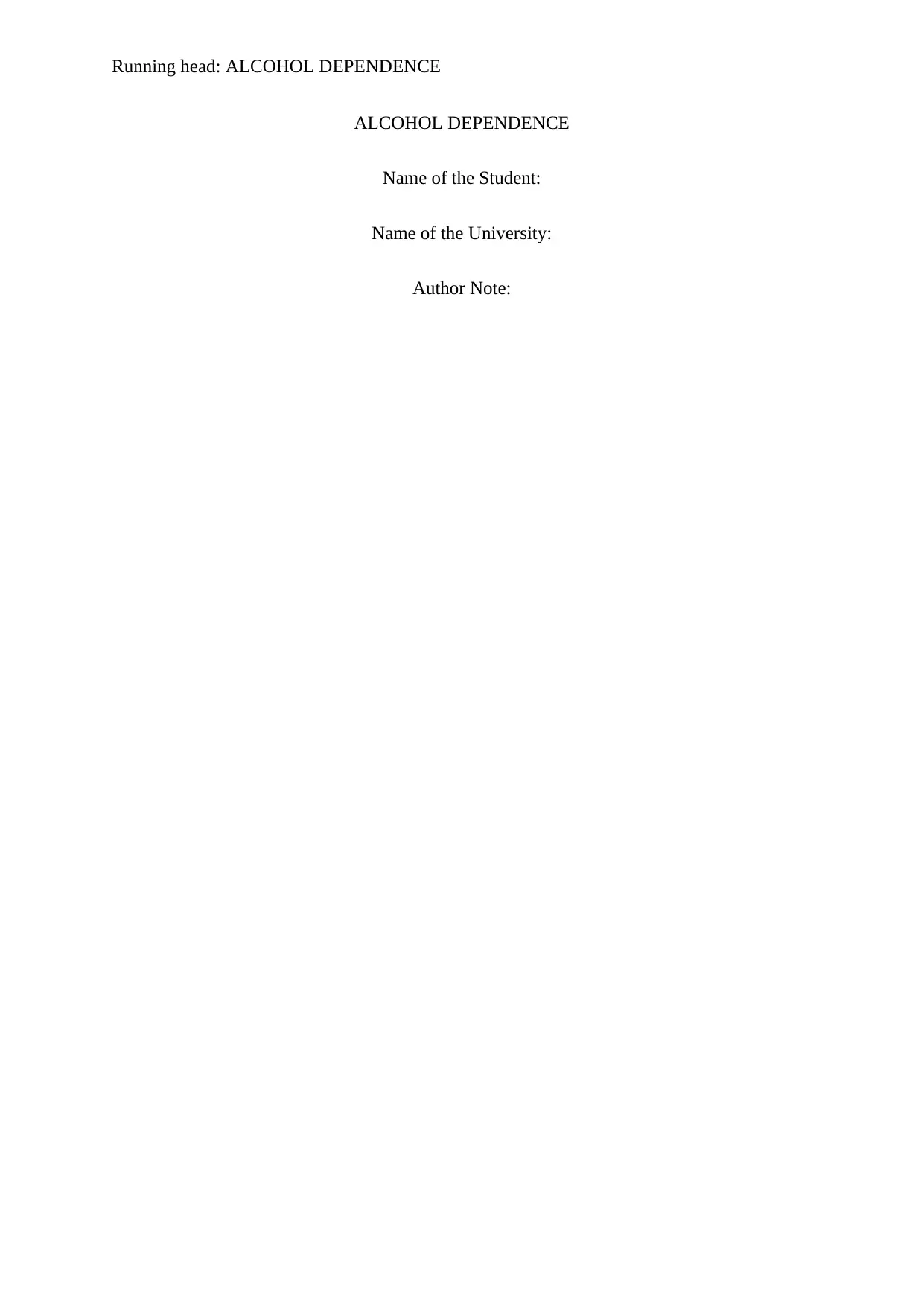
Running head: ALCOHOL DEPENDENCE
ALCOHOL DEPENDENCE
Name of the Student:
Name of the University:
Author Note:
ALCOHOL DEPENDENCE
Name of the Student:
Name of the University:
Author Note:
Paraphrase This Document
Need a fresh take? Get an instant paraphrase of this document with our AI Paraphraser
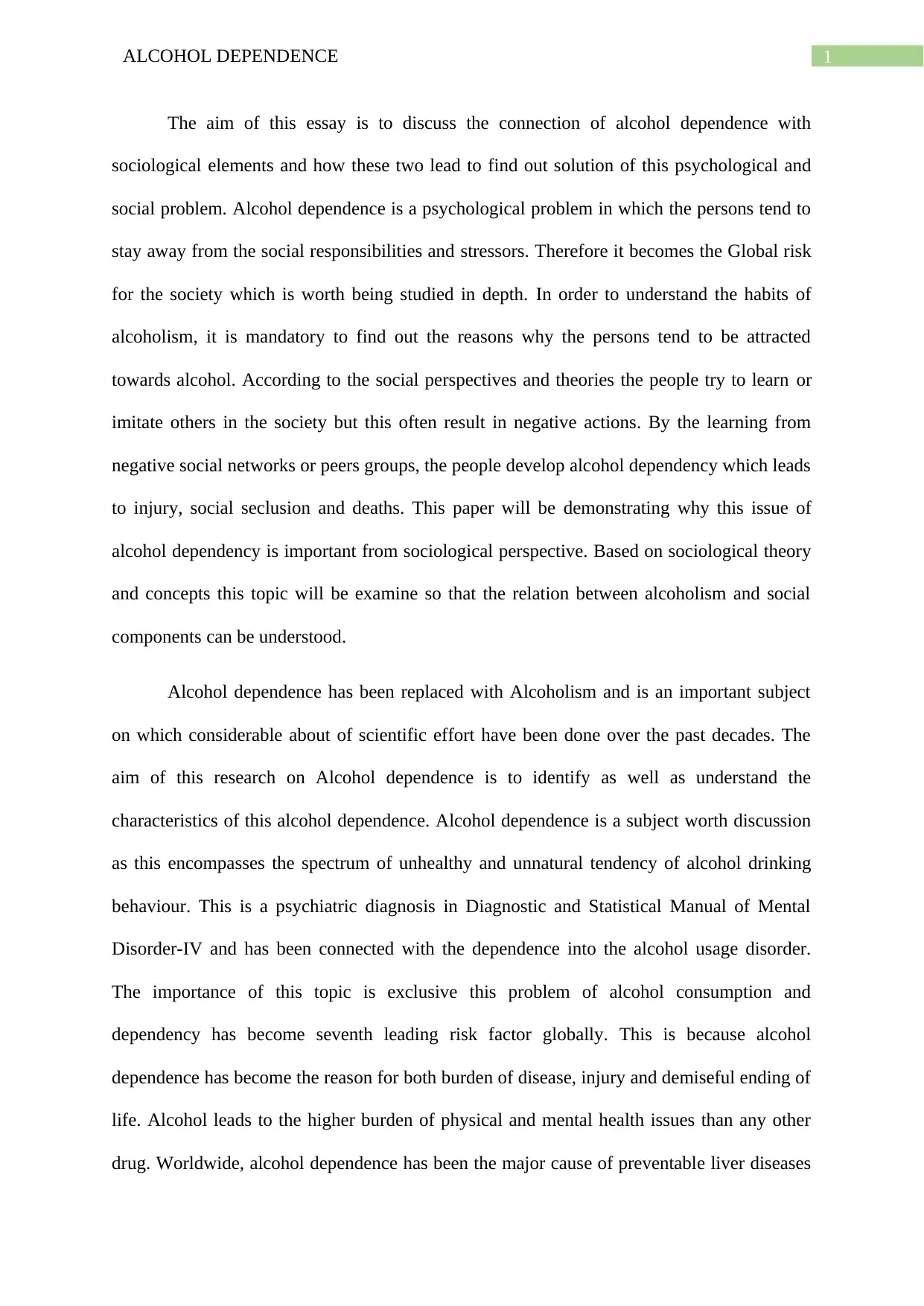
1ALCOHOL DEPENDENCE
The aim of this essay is to discuss the connection of alcohol dependence with
sociological elements and how these two lead to find out solution of this psychological and
social problem. Alcohol dependence is a psychological problem in which the persons tend to
stay away from the social responsibilities and stressors. Therefore it becomes the Global risk
for the society which is worth being studied in depth. In order to understand the habits of
alcoholism, it is mandatory to find out the reasons why the persons tend to be attracted
towards alcohol. According to the social perspectives and theories the people try to learn or
imitate others in the society but this often result in negative actions. By the learning from
negative social networks or peers groups, the people develop alcohol dependency which leads
to injury, social seclusion and deaths. This paper will be demonstrating why this issue of
alcohol dependency is important from sociological perspective. Based on sociological theory
and concepts this topic will be examine so that the relation between alcoholism and social
components can be understood.
Alcohol dependence has been replaced with Alcoholism and is an important subject
on which considerable about of scientific effort have been done over the past decades. The
aim of this research on Alcohol dependence is to identify as well as understand the
characteristics of this alcohol dependence. Alcohol dependence is a subject worth discussion
as this encompasses the spectrum of unhealthy and unnatural tendency of alcohol drinking
behaviour. This is a psychiatric diagnosis in Diagnostic and Statistical Manual of Mental
Disorder-IV and has been connected with the dependence into the alcohol usage disorder.
The importance of this topic is exclusive this problem of alcohol consumption and
dependency has become seventh leading risk factor globally. This is because alcohol
dependence has become the reason for both burden of disease, injury and demiseful ending of
life. Alcohol leads to the higher burden of physical and mental health issues than any other
drug. Worldwide, alcohol dependence has been the major cause of preventable liver diseases
The aim of this essay is to discuss the connection of alcohol dependence with
sociological elements and how these two lead to find out solution of this psychological and
social problem. Alcohol dependence is a psychological problem in which the persons tend to
stay away from the social responsibilities and stressors. Therefore it becomes the Global risk
for the society which is worth being studied in depth. In order to understand the habits of
alcoholism, it is mandatory to find out the reasons why the persons tend to be attracted
towards alcohol. According to the social perspectives and theories the people try to learn or
imitate others in the society but this often result in negative actions. By the learning from
negative social networks or peers groups, the people develop alcohol dependency which leads
to injury, social seclusion and deaths. This paper will be demonstrating why this issue of
alcohol dependency is important from sociological perspective. Based on sociological theory
and concepts this topic will be examine so that the relation between alcoholism and social
components can be understood.
Alcohol dependence has been replaced with Alcoholism and is an important subject
on which considerable about of scientific effort have been done over the past decades. The
aim of this research on Alcohol dependence is to identify as well as understand the
characteristics of this alcohol dependence. Alcohol dependence is a subject worth discussion
as this encompasses the spectrum of unhealthy and unnatural tendency of alcohol drinking
behaviour. This is a psychiatric diagnosis in Diagnostic and Statistical Manual of Mental
Disorder-IV and has been connected with the dependence into the alcohol usage disorder.
The importance of this topic is exclusive this problem of alcohol consumption and
dependency has become seventh leading risk factor globally. This is because alcohol
dependence has become the reason for both burden of disease, injury and demiseful ending of
life. Alcohol leads to the higher burden of physical and mental health issues than any other
drug. Worldwide, alcohol dependence has been the major cause of preventable liver diseases
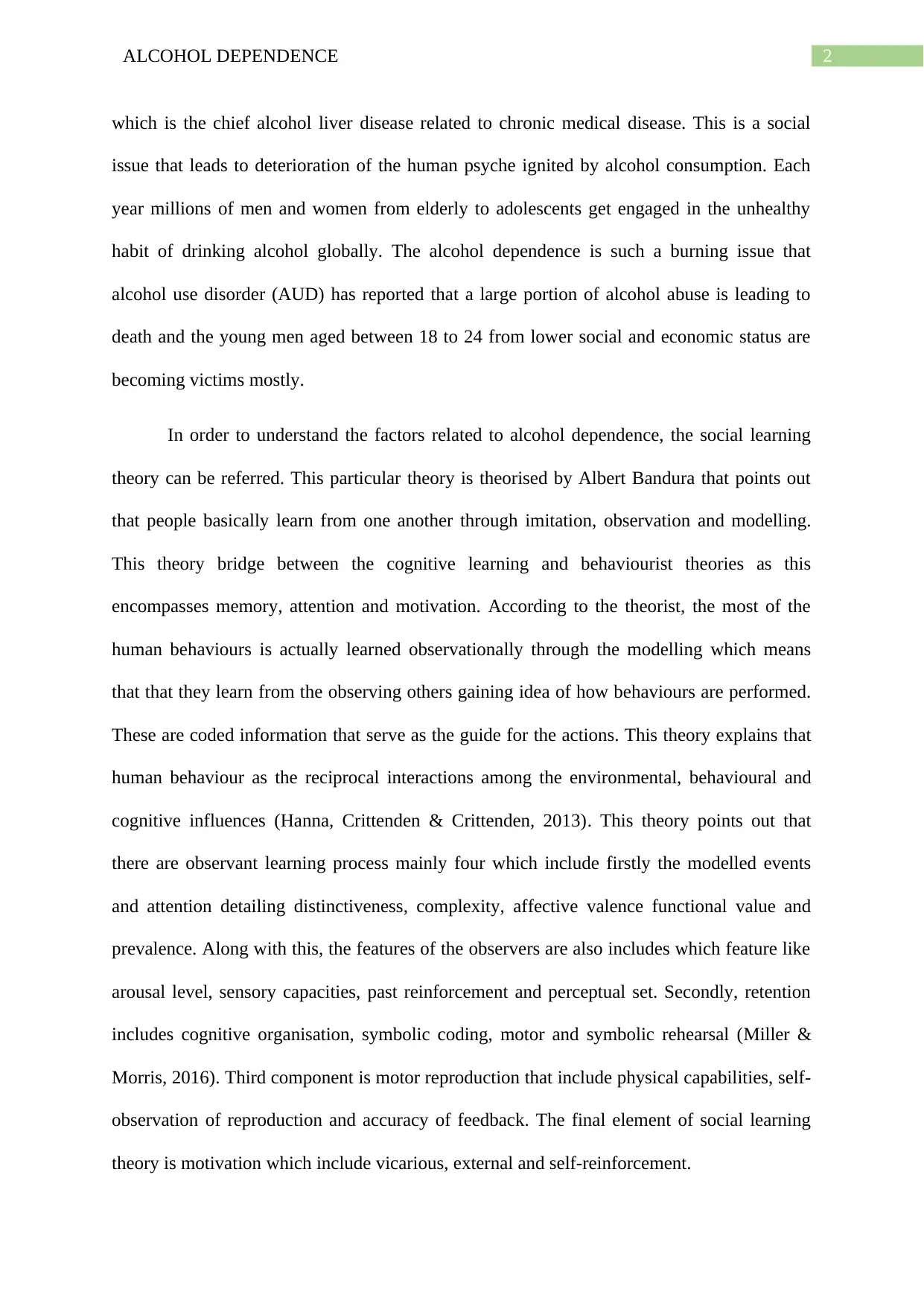
2ALCOHOL DEPENDENCE
which is the chief alcohol liver disease related to chronic medical disease. This is a social
issue that leads to deterioration of the human psyche ignited by alcohol consumption. Each
year millions of men and women from elderly to adolescents get engaged in the unhealthy
habit of drinking alcohol globally. The alcohol dependence is such a burning issue that
alcohol use disorder (AUD) has reported that a large portion of alcohol abuse is leading to
death and the young men aged between 18 to 24 from lower social and economic status are
becoming victims mostly.
In order to understand the factors related to alcohol dependence, the social learning
theory can be referred. This particular theory is theorised by Albert Bandura that points out
that people basically learn from one another through imitation, observation and modelling.
This theory bridge between the cognitive learning and behaviourist theories as this
encompasses memory, attention and motivation. According to the theorist, the most of the
human behaviours is actually learned observationally through the modelling which means
that that they learn from the observing others gaining idea of how behaviours are performed.
These are coded information that serve as the guide for the actions. This theory explains that
human behaviour as the reciprocal interactions among the environmental, behavioural and
cognitive influences (Hanna, Crittenden & Crittenden, 2013). This theory points out that
there are observant learning process mainly four which include firstly the modelled events
and attention detailing distinctiveness, complexity, affective valence functional value and
prevalence. Along with this, the features of the observers are also includes which feature like
arousal level, sensory capacities, past reinforcement and perceptual set. Secondly, retention
includes cognitive organisation, symbolic coding, motor and symbolic rehearsal (Miller &
Morris, 2016). Third component is motor reproduction that include physical capabilities, self-
observation of reproduction and accuracy of feedback. The final element of social learning
theory is motivation which include vicarious, external and self-reinforcement.
which is the chief alcohol liver disease related to chronic medical disease. This is a social
issue that leads to deterioration of the human psyche ignited by alcohol consumption. Each
year millions of men and women from elderly to adolescents get engaged in the unhealthy
habit of drinking alcohol globally. The alcohol dependence is such a burning issue that
alcohol use disorder (AUD) has reported that a large portion of alcohol abuse is leading to
death and the young men aged between 18 to 24 from lower social and economic status are
becoming victims mostly.
In order to understand the factors related to alcohol dependence, the social learning
theory can be referred. This particular theory is theorised by Albert Bandura that points out
that people basically learn from one another through imitation, observation and modelling.
This theory bridge between the cognitive learning and behaviourist theories as this
encompasses memory, attention and motivation. According to the theorist, the most of the
human behaviours is actually learned observationally through the modelling which means
that that they learn from the observing others gaining idea of how behaviours are performed.
These are coded information that serve as the guide for the actions. This theory explains that
human behaviour as the reciprocal interactions among the environmental, behavioural and
cognitive influences (Hanna, Crittenden & Crittenden, 2013). This theory points out that
there are observant learning process mainly four which include firstly the modelled events
and attention detailing distinctiveness, complexity, affective valence functional value and
prevalence. Along with this, the features of the observers are also includes which feature like
arousal level, sensory capacities, past reinforcement and perceptual set. Secondly, retention
includes cognitive organisation, symbolic coding, motor and symbolic rehearsal (Miller &
Morris, 2016). Third component is motor reproduction that include physical capabilities, self-
observation of reproduction and accuracy of feedback. The final element of social learning
theory is motivation which include vicarious, external and self-reinforcement.
⊘ This is a preview!⊘
Do you want full access?
Subscribe today to unlock all pages.

Trusted by 1+ million students worldwide
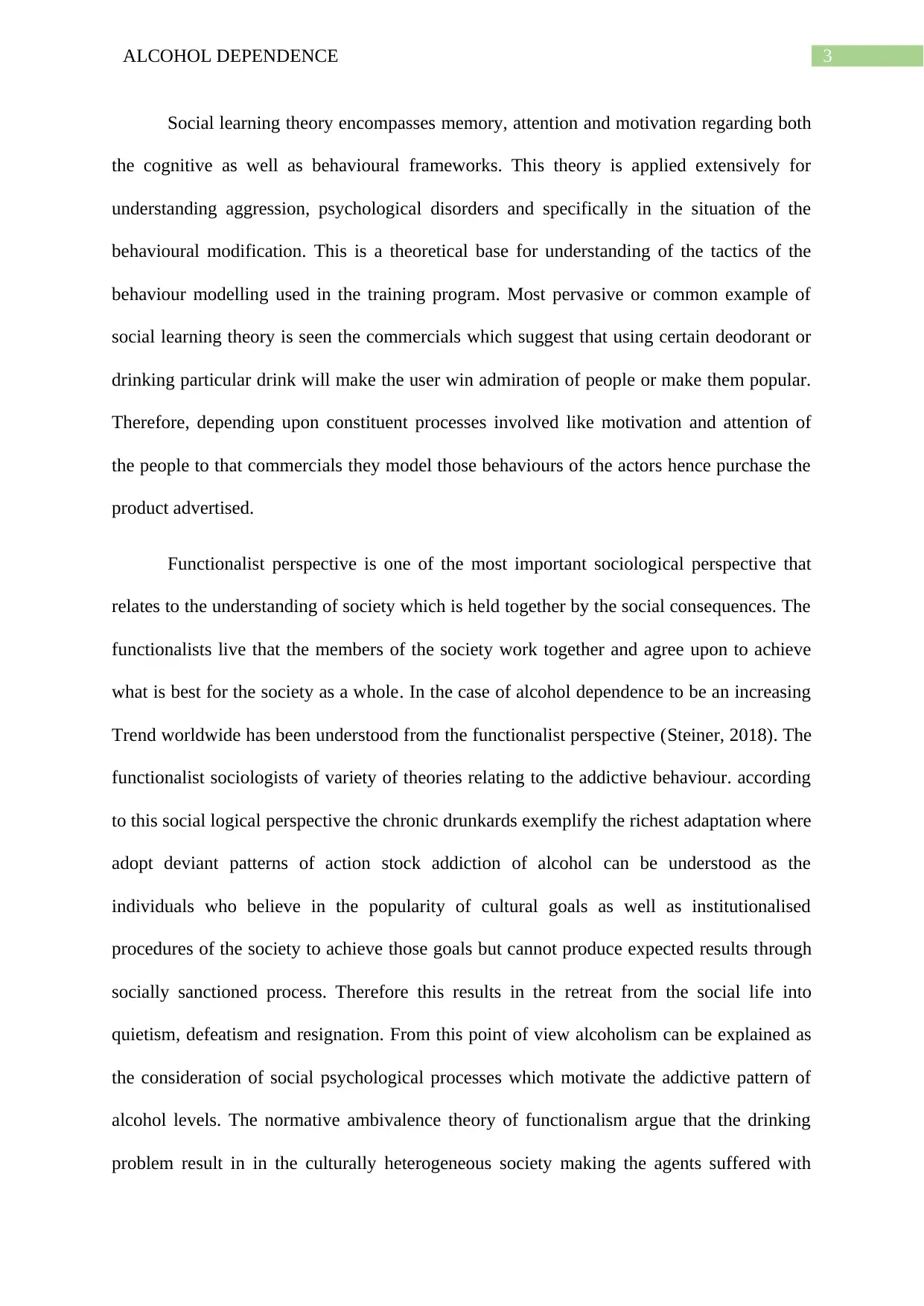
3ALCOHOL DEPENDENCE
Social learning theory encompasses memory, attention and motivation regarding both
the cognitive as well as behavioural frameworks. This theory is applied extensively for
understanding aggression, psychological disorders and specifically in the situation of the
behavioural modification. This is a theoretical base for understanding of the tactics of the
behaviour modelling used in the training program. Most pervasive or common example of
social learning theory is seen the commercials which suggest that using certain deodorant or
drinking particular drink will make the user win admiration of people or make them popular.
Therefore, depending upon constituent processes involved like motivation and attention of
the people to that commercials they model those behaviours of the actors hence purchase the
product advertised.
Functionalist perspective is one of the most important sociological perspective that
relates to the understanding of society which is held together by the social consequences. The
functionalists live that the members of the society work together and agree upon to achieve
what is best for the society as a whole. In the case of alcohol dependence to be an increasing
Trend worldwide has been understood from the functionalist perspective (Steiner, 2018). The
functionalist sociologists of variety of theories relating to the addictive behaviour. according
to this social logical perspective the chronic drunkards exemplify the richest adaptation where
adopt deviant patterns of action stock addiction of alcohol can be understood as the
individuals who believe in the popularity of cultural goals as well as institutionalised
procedures of the society to achieve those goals but cannot produce expected results through
socially sanctioned process. Therefore this results in the retreat from the social life into
quietism, defeatism and resignation. From this point of view alcoholism can be explained as
the consideration of social psychological processes which motivate the addictive pattern of
alcohol levels. The normative ambivalence theory of functionalism argue that the drinking
problem result in in the culturally heterogeneous society making the agents suffered with
Social learning theory encompasses memory, attention and motivation regarding both
the cognitive as well as behavioural frameworks. This theory is applied extensively for
understanding aggression, psychological disorders and specifically in the situation of the
behavioural modification. This is a theoretical base for understanding of the tactics of the
behaviour modelling used in the training program. Most pervasive or common example of
social learning theory is seen the commercials which suggest that using certain deodorant or
drinking particular drink will make the user win admiration of people or make them popular.
Therefore, depending upon constituent processes involved like motivation and attention of
the people to that commercials they model those behaviours of the actors hence purchase the
product advertised.
Functionalist perspective is one of the most important sociological perspective that
relates to the understanding of society which is held together by the social consequences. The
functionalists live that the members of the society work together and agree upon to achieve
what is best for the society as a whole. In the case of alcohol dependence to be an increasing
Trend worldwide has been understood from the functionalist perspective (Steiner, 2018). The
functionalist sociologists of variety of theories relating to the addictive behaviour. according
to this social logical perspective the chronic drunkards exemplify the richest adaptation where
adopt deviant patterns of action stock addiction of alcohol can be understood as the
individuals who believe in the popularity of cultural goals as well as institutionalised
procedures of the society to achieve those goals but cannot produce expected results through
socially sanctioned process. Therefore this results in the retreat from the social life into
quietism, defeatism and resignation. From this point of view alcoholism can be explained as
the consideration of social psychological processes which motivate the addictive pattern of
alcohol levels. The normative ambivalence theory of functionalism argue that the drinking
problem result in in the culturally heterogeneous society making the agents suffered with
Paraphrase This Document
Need a fresh take? Get an instant paraphrase of this document with our AI Paraphraser
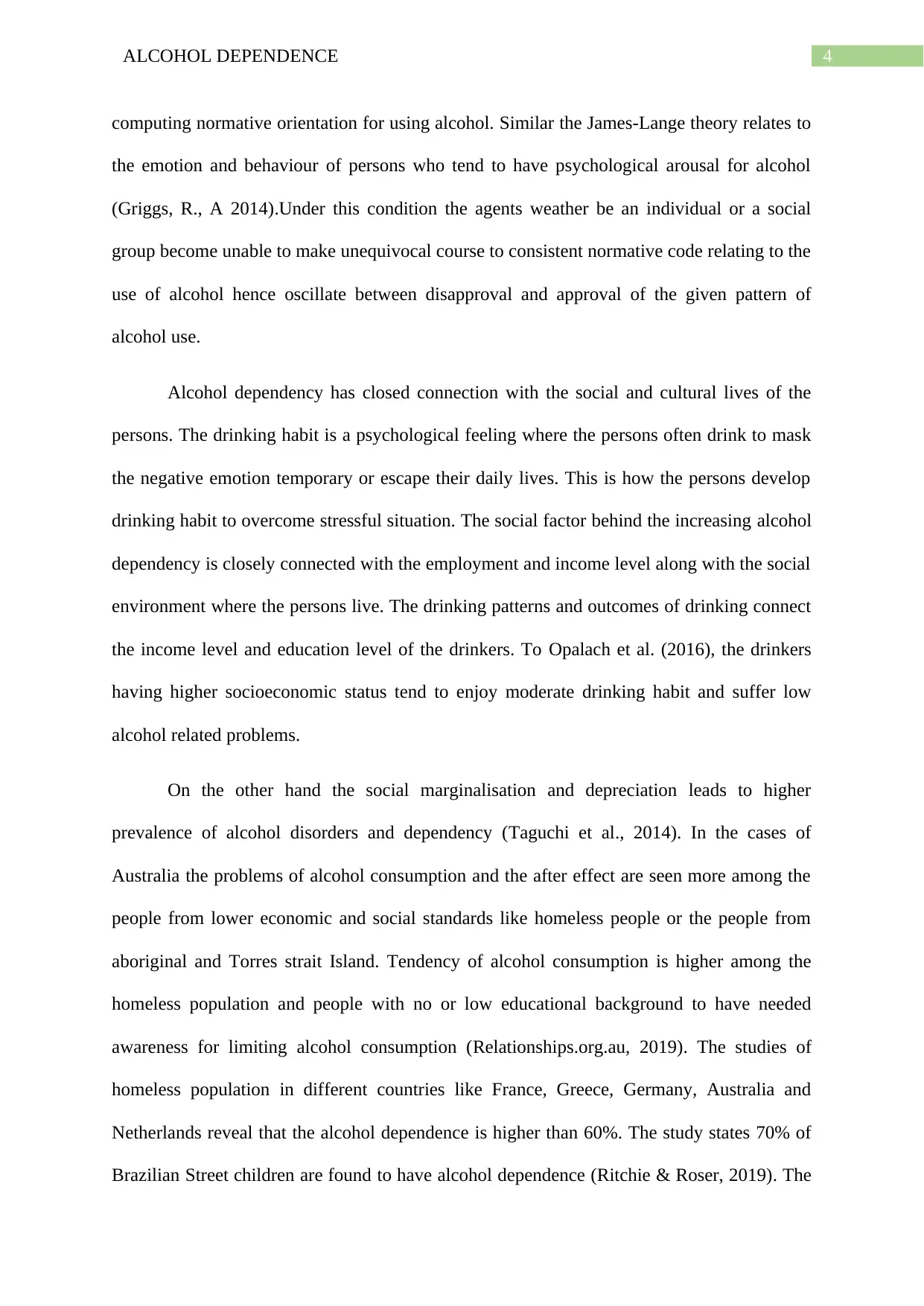
4ALCOHOL DEPENDENCE
computing normative orientation for using alcohol. Similar the James-Lange theory relates to
the emotion and behaviour of persons who tend to have psychological arousal for alcohol
(Griggs, R., A 2014).Under this condition the agents weather be an individual or a social
group become unable to make unequivocal course to consistent normative code relating to the
use of alcohol hence oscillate between disapproval and approval of the given pattern of
alcohol use.
Alcohol dependency has closed connection with the social and cultural lives of the
persons. The drinking habit is a psychological feeling where the persons often drink to mask
the negative emotion temporary or escape their daily lives. This is how the persons develop
drinking habit to overcome stressful situation. The social factor behind the increasing alcohol
dependency is closely connected with the employment and income level along with the social
environment where the persons live. The drinking patterns and outcomes of drinking connect
the income level and education level of the drinkers. To Opalach et al. (2016), the drinkers
having higher socioeconomic status tend to enjoy moderate drinking habit and suffer low
alcohol related problems.
On the other hand the social marginalisation and depreciation leads to higher
prevalence of alcohol disorders and dependency (Taguchi et al., 2014). In the cases of
Australia the problems of alcohol consumption and the after effect are seen more among the
people from lower economic and social standards like homeless people or the people from
aboriginal and Torres strait Island. Tendency of alcohol consumption is higher among the
homeless population and people with no or low educational background to have needed
awareness for limiting alcohol consumption (Relationships.org.au, 2019). The studies of
homeless population in different countries like France, Greece, Germany, Australia and
Netherlands reveal that the alcohol dependence is higher than 60%. The study states 70% of
Brazilian Street children are found to have alcohol dependence (Ritchie & Roser, 2019). The
computing normative orientation for using alcohol. Similar the James-Lange theory relates to
the emotion and behaviour of persons who tend to have psychological arousal for alcohol
(Griggs, R., A 2014).Under this condition the agents weather be an individual or a social
group become unable to make unequivocal course to consistent normative code relating to the
use of alcohol hence oscillate between disapproval and approval of the given pattern of
alcohol use.
Alcohol dependency has closed connection with the social and cultural lives of the
persons. The drinking habit is a psychological feeling where the persons often drink to mask
the negative emotion temporary or escape their daily lives. This is how the persons develop
drinking habit to overcome stressful situation. The social factor behind the increasing alcohol
dependency is closely connected with the employment and income level along with the social
environment where the persons live. The drinking patterns and outcomes of drinking connect
the income level and education level of the drinkers. To Opalach et al. (2016), the drinkers
having higher socioeconomic status tend to enjoy moderate drinking habit and suffer low
alcohol related problems.
On the other hand the social marginalisation and depreciation leads to higher
prevalence of alcohol disorders and dependency (Taguchi et al., 2014). In the cases of
Australia the problems of alcohol consumption and the after effect are seen more among the
people from lower economic and social standards like homeless people or the people from
aboriginal and Torres strait Island. Tendency of alcohol consumption is higher among the
homeless population and people with no or low educational background to have needed
awareness for limiting alcohol consumption (Relationships.org.au, 2019). The studies of
homeless population in different countries like France, Greece, Germany, Australia and
Netherlands reveal that the alcohol dependence is higher than 60%. The study states 70% of
Brazilian Street children are found to have alcohol dependence (Ritchie & Roser, 2019). The
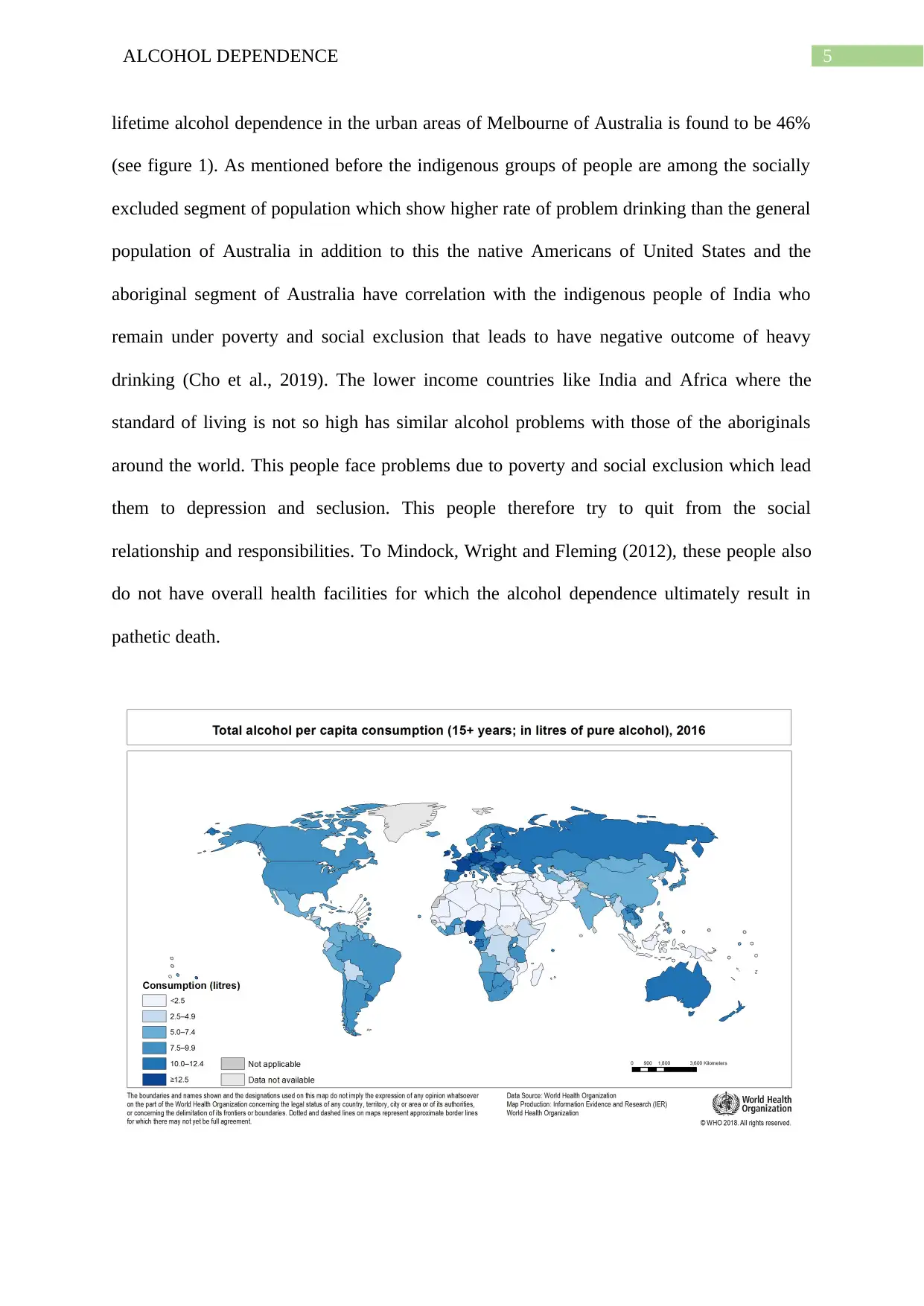
5ALCOHOL DEPENDENCE
lifetime alcohol dependence in the urban areas of Melbourne of Australia is found to be 46%
(see figure 1). As mentioned before the indigenous groups of people are among the socially
excluded segment of population which show higher rate of problem drinking than the general
population of Australia in addition to this the native Americans of United States and the
aboriginal segment of Australia have correlation with the indigenous people of India who
remain under poverty and social exclusion that leads to have negative outcome of heavy
drinking (Cho et al., 2019). The lower income countries like India and Africa where the
standard of living is not so high has similar alcohol problems with those of the aboriginals
around the world. This people face problems due to poverty and social exclusion which lead
them to depression and seclusion. This people therefore try to quit from the social
relationship and responsibilities. To Mindock, Wright and Fleming (2012), these people also
do not have overall health facilities for which the alcohol dependence ultimately result in
pathetic death.
lifetime alcohol dependence in the urban areas of Melbourne of Australia is found to be 46%
(see figure 1). As mentioned before the indigenous groups of people are among the socially
excluded segment of population which show higher rate of problem drinking than the general
population of Australia in addition to this the native Americans of United States and the
aboriginal segment of Australia have correlation with the indigenous people of India who
remain under poverty and social exclusion that leads to have negative outcome of heavy
drinking (Cho et al., 2019). The lower income countries like India and Africa where the
standard of living is not so high has similar alcohol problems with those of the aboriginals
around the world. This people face problems due to poverty and social exclusion which lead
them to depression and seclusion. This people therefore try to quit from the social
relationship and responsibilities. To Mindock, Wright and Fleming (2012), these people also
do not have overall health facilities for which the alcohol dependence ultimately result in
pathetic death.
⊘ This is a preview!⊘
Do you want full access?
Subscribe today to unlock all pages.

Trusted by 1+ million students worldwide
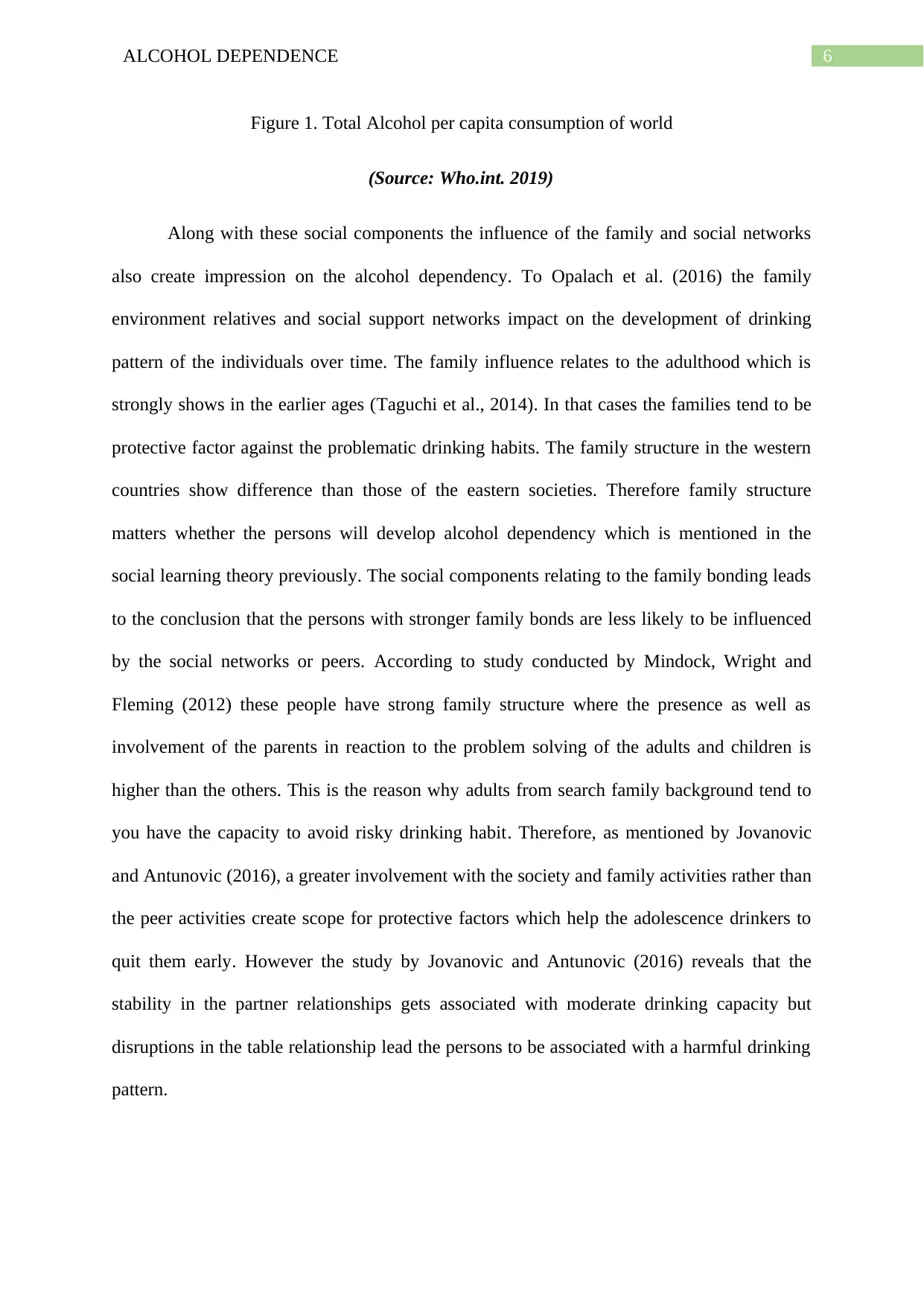
6ALCOHOL DEPENDENCE
Figure 1. Total Alcohol per capita consumption of world
(Source: Who.int. 2019)
Along with these social components the influence of the family and social networks
also create impression on the alcohol dependency. To Opalach et al. (2016) the family
environment relatives and social support networks impact on the development of drinking
pattern of the individuals over time. The family influence relates to the adulthood which is
strongly shows in the earlier ages (Taguchi et al., 2014). In that cases the families tend to be
protective factor against the problematic drinking habits. The family structure in the western
countries show difference than those of the eastern societies. Therefore family structure
matters whether the persons will develop alcohol dependency which is mentioned in the
social learning theory previously. The social components relating to the family bonding leads
to the conclusion that the persons with stronger family bonds are less likely to be influenced
by the social networks or peers. According to study conducted by Mindock, Wright and
Fleming (2012) these people have strong family structure where the presence as well as
involvement of the parents in reaction to the problem solving of the adults and children is
higher than the others. This is the reason why adults from search family background tend to
you have the capacity to avoid risky drinking habit. Therefore, as mentioned by Jovanovic
and Antunovic (2016), a greater involvement with the society and family activities rather than
the peer activities create scope for protective factors which help the adolescence drinkers to
quit them early. However the study by Jovanovic and Antunovic (2016) reveals that the
stability in the partner relationships gets associated with moderate drinking capacity but
disruptions in the table relationship lead the persons to be associated with a harmful drinking
pattern.
Figure 1. Total Alcohol per capita consumption of world
(Source: Who.int. 2019)
Along with these social components the influence of the family and social networks
also create impression on the alcohol dependency. To Opalach et al. (2016) the family
environment relatives and social support networks impact on the development of drinking
pattern of the individuals over time. The family influence relates to the adulthood which is
strongly shows in the earlier ages (Taguchi et al., 2014). In that cases the families tend to be
protective factor against the problematic drinking habits. The family structure in the western
countries show difference than those of the eastern societies. Therefore family structure
matters whether the persons will develop alcohol dependency which is mentioned in the
social learning theory previously. The social components relating to the family bonding leads
to the conclusion that the persons with stronger family bonds are less likely to be influenced
by the social networks or peers. According to study conducted by Mindock, Wright and
Fleming (2012) these people have strong family structure where the presence as well as
involvement of the parents in reaction to the problem solving of the adults and children is
higher than the others. This is the reason why adults from search family background tend to
you have the capacity to avoid risky drinking habit. Therefore, as mentioned by Jovanovic
and Antunovic (2016), a greater involvement with the society and family activities rather than
the peer activities create scope for protective factors which help the adolescence drinkers to
quit them early. However the study by Jovanovic and Antunovic (2016) reveals that the
stability in the partner relationships gets associated with moderate drinking capacity but
disruptions in the table relationship lead the persons to be associated with a harmful drinking
pattern.
Paraphrase This Document
Need a fresh take? Get an instant paraphrase of this document with our AI Paraphraser
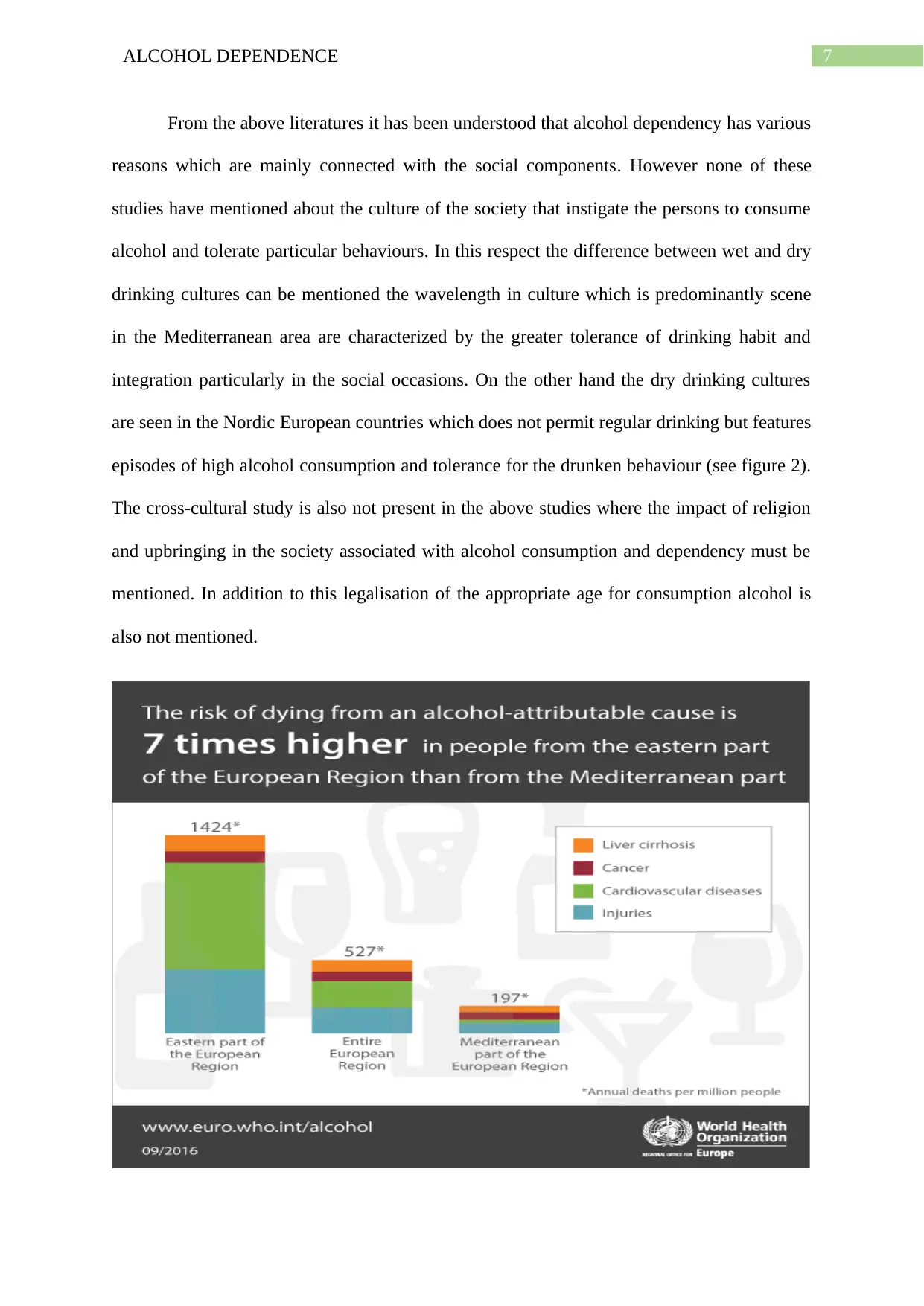
7ALCOHOL DEPENDENCE
From the above literatures it has been understood that alcohol dependency has various
reasons which are mainly connected with the social components. However none of these
studies have mentioned about the culture of the society that instigate the persons to consume
alcohol and tolerate particular behaviours. In this respect the difference between wet and dry
drinking cultures can be mentioned the wavelength in culture which is predominantly scene
in the Mediterranean area are characterized by the greater tolerance of drinking habit and
integration particularly in the social occasions. On the other hand the dry drinking cultures
are seen in the Nordic European countries which does not permit regular drinking but features
episodes of high alcohol consumption and tolerance for the drunken behaviour (see figure 2).
The cross-cultural study is also not present in the above studies where the impact of religion
and upbringing in the society associated with alcohol consumption and dependency must be
mentioned. In addition to this legalisation of the appropriate age for consumption alcohol is
also not mentioned.
From the above literatures it has been understood that alcohol dependency has various
reasons which are mainly connected with the social components. However none of these
studies have mentioned about the culture of the society that instigate the persons to consume
alcohol and tolerate particular behaviours. In this respect the difference between wet and dry
drinking cultures can be mentioned the wavelength in culture which is predominantly scene
in the Mediterranean area are characterized by the greater tolerance of drinking habit and
integration particularly in the social occasions. On the other hand the dry drinking cultures
are seen in the Nordic European countries which does not permit regular drinking but features
episodes of high alcohol consumption and tolerance for the drunken behaviour (see figure 2).
The cross-cultural study is also not present in the above studies where the impact of religion
and upbringing in the society associated with alcohol consumption and dependency must be
mentioned. In addition to this legalisation of the appropriate age for consumption alcohol is
also not mentioned.
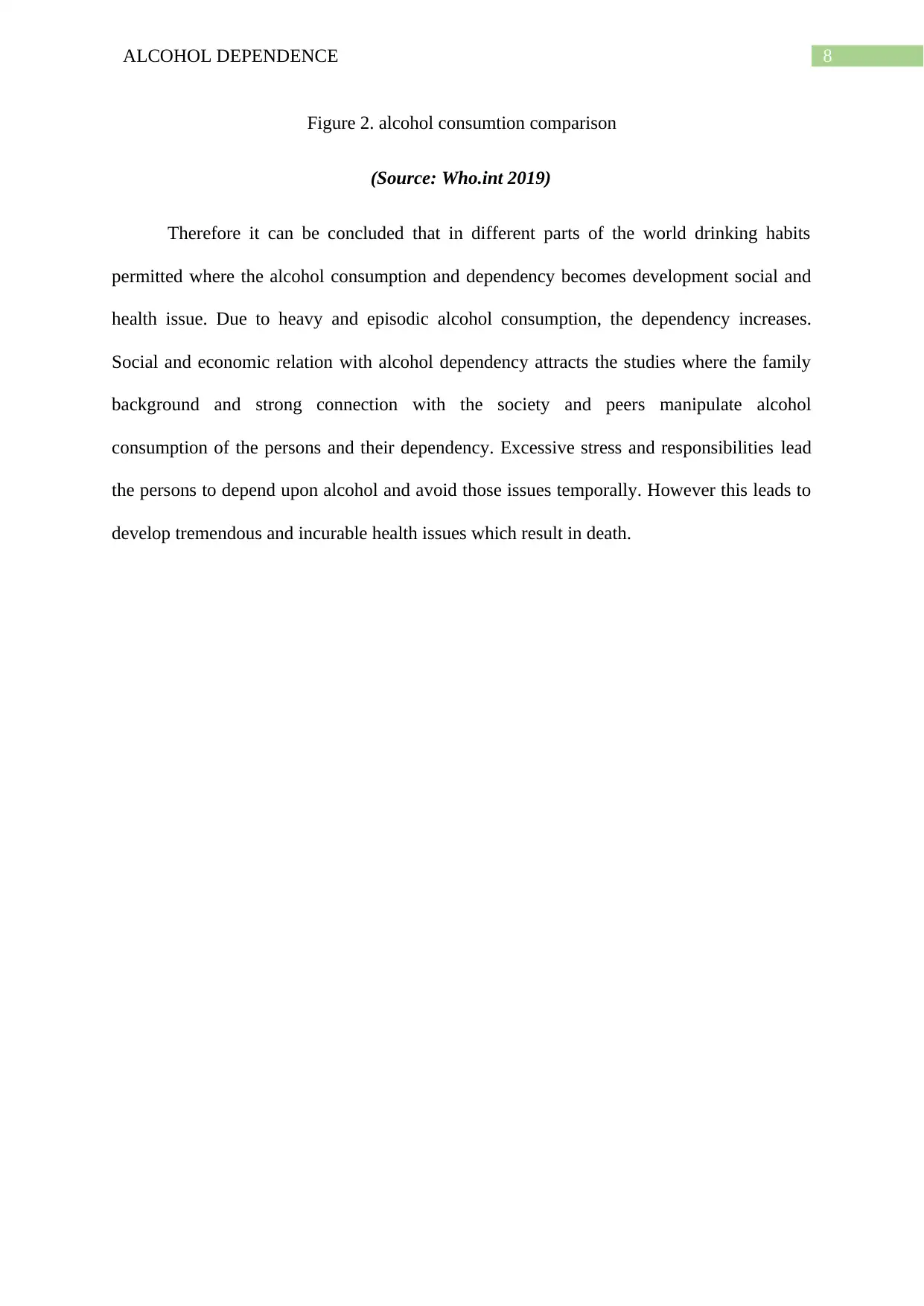
8ALCOHOL DEPENDENCE
Figure 2. alcohol consumtion comparison
(Source: Who.int 2019)
Therefore it can be concluded that in different parts of the world drinking habits
permitted where the alcohol consumption and dependency becomes development social and
health issue. Due to heavy and episodic alcohol consumption, the dependency increases.
Social and economic relation with alcohol dependency attracts the studies where the family
background and strong connection with the society and peers manipulate alcohol
consumption of the persons and their dependency. Excessive stress and responsibilities lead
the persons to depend upon alcohol and avoid those issues temporally. However this leads to
develop tremendous and incurable health issues which result in death.
Figure 2. alcohol consumtion comparison
(Source: Who.int 2019)
Therefore it can be concluded that in different parts of the world drinking habits
permitted where the alcohol consumption and dependency becomes development social and
health issue. Due to heavy and episodic alcohol consumption, the dependency increases.
Social and economic relation with alcohol dependency attracts the studies where the family
background and strong connection with the society and peers manipulate alcohol
consumption of the persons and their dependency. Excessive stress and responsibilities lead
the persons to depend upon alcohol and avoid those issues temporally. However this leads to
develop tremendous and incurable health issues which result in death.
⊘ This is a preview!⊘
Do you want full access?
Subscribe today to unlock all pages.

Trusted by 1+ million students worldwide
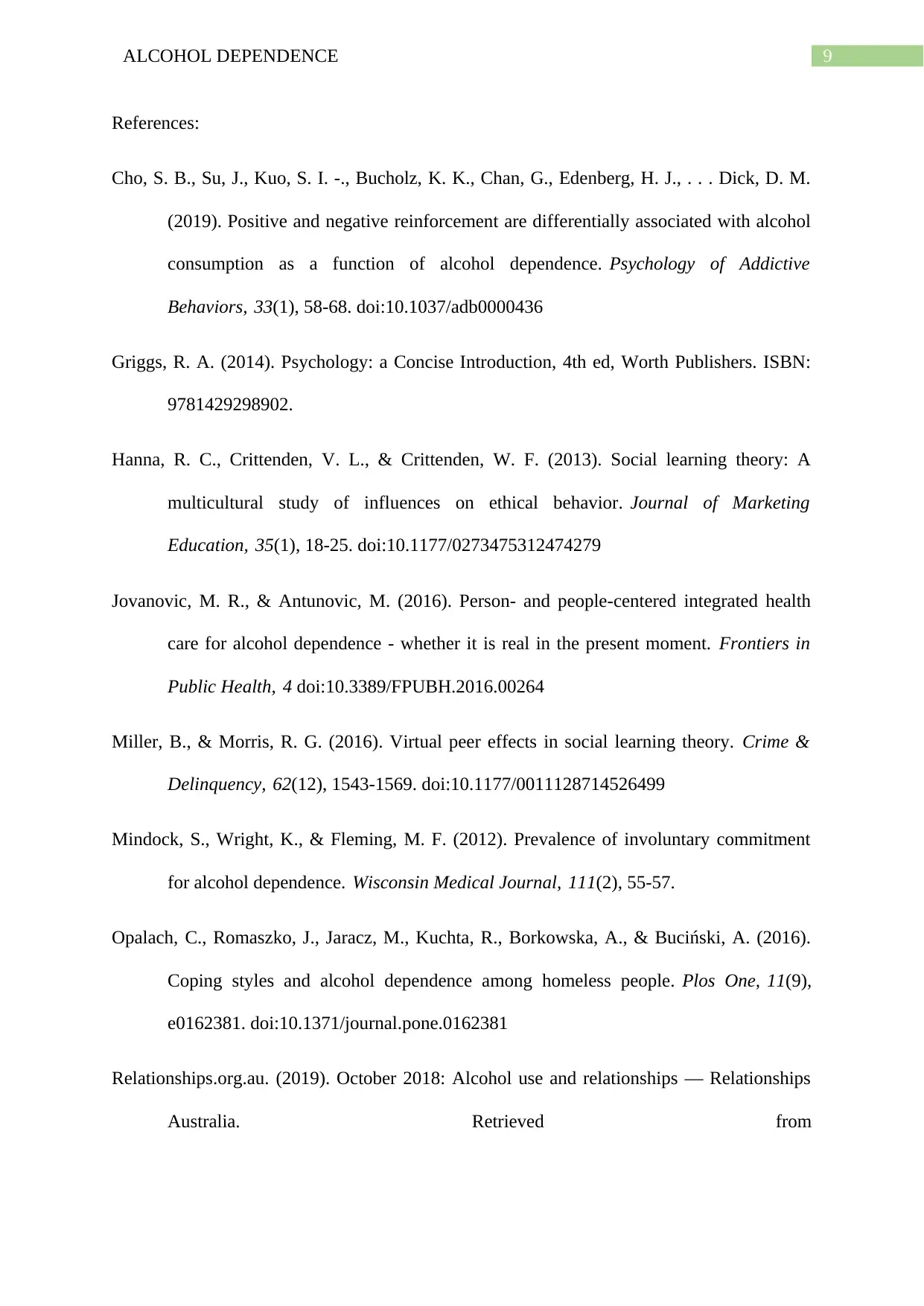
9ALCOHOL DEPENDENCE
References:
Cho, S. B., Su, J., Kuo, S. I. -., Bucholz, K. K., Chan, G., Edenberg, H. J., . . . Dick, D. M.
(2019). Positive and negative reinforcement are differentially associated with alcohol
consumption as a function of alcohol dependence. Psychology of Addictive
Behaviors, 33(1), 58-68. doi:10.1037/adb0000436
Griggs, R. A. (2014). Psychology: a Concise Introduction, 4th ed, Worth Publishers. ISBN:
9781429298902.
Hanna, R. C., Crittenden, V. L., & Crittenden, W. F. (2013). Social learning theory: A
multicultural study of influences on ethical behavior. Journal of Marketing
Education, 35(1), 18-25. doi:10.1177/0273475312474279
Jovanovic, M. R., & Antunovic, M. (2016). Person- and people-centered integrated health
care for alcohol dependence - whether it is real in the present moment. Frontiers in
Public Health, 4 doi:10.3389/FPUBH.2016.00264
Miller, B., & Morris, R. G. (2016). Virtual peer effects in social learning theory. Crime &
Delinquency, 62(12), 1543-1569. doi:10.1177/0011128714526499
Mindock, S., Wright, K., & Fleming, M. F. (2012). Prevalence of involuntary commitment
for alcohol dependence. Wisconsin Medical Journal, 111(2), 55-57.
Opalach, C., Romaszko, J., Jaracz, M., Kuchta, R., Borkowska, A., & Buciński, A. (2016).
Coping styles and alcohol dependence among homeless people. Plos One, 11(9),
e0162381. doi:10.1371/journal.pone.0162381
Relationships.org.au. (2019). October 2018: Alcohol use and relationships — Relationships
Australia. Retrieved from
References:
Cho, S. B., Su, J., Kuo, S. I. -., Bucholz, K. K., Chan, G., Edenberg, H. J., . . . Dick, D. M.
(2019). Positive and negative reinforcement are differentially associated with alcohol
consumption as a function of alcohol dependence. Psychology of Addictive
Behaviors, 33(1), 58-68. doi:10.1037/adb0000436
Griggs, R. A. (2014). Psychology: a Concise Introduction, 4th ed, Worth Publishers. ISBN:
9781429298902.
Hanna, R. C., Crittenden, V. L., & Crittenden, W. F. (2013). Social learning theory: A
multicultural study of influences on ethical behavior. Journal of Marketing
Education, 35(1), 18-25. doi:10.1177/0273475312474279
Jovanovic, M. R., & Antunovic, M. (2016). Person- and people-centered integrated health
care for alcohol dependence - whether it is real in the present moment. Frontiers in
Public Health, 4 doi:10.3389/FPUBH.2016.00264
Miller, B., & Morris, R. G. (2016). Virtual peer effects in social learning theory. Crime &
Delinquency, 62(12), 1543-1569. doi:10.1177/0011128714526499
Mindock, S., Wright, K., & Fleming, M. F. (2012). Prevalence of involuntary commitment
for alcohol dependence. Wisconsin Medical Journal, 111(2), 55-57.
Opalach, C., Romaszko, J., Jaracz, M., Kuchta, R., Borkowska, A., & Buciński, A. (2016).
Coping styles and alcohol dependence among homeless people. Plos One, 11(9),
e0162381. doi:10.1371/journal.pone.0162381
Relationships.org.au. (2019). October 2018: Alcohol use and relationships — Relationships
Australia. Retrieved from
Paraphrase This Document
Need a fresh take? Get an instant paraphrase of this document with our AI Paraphraser
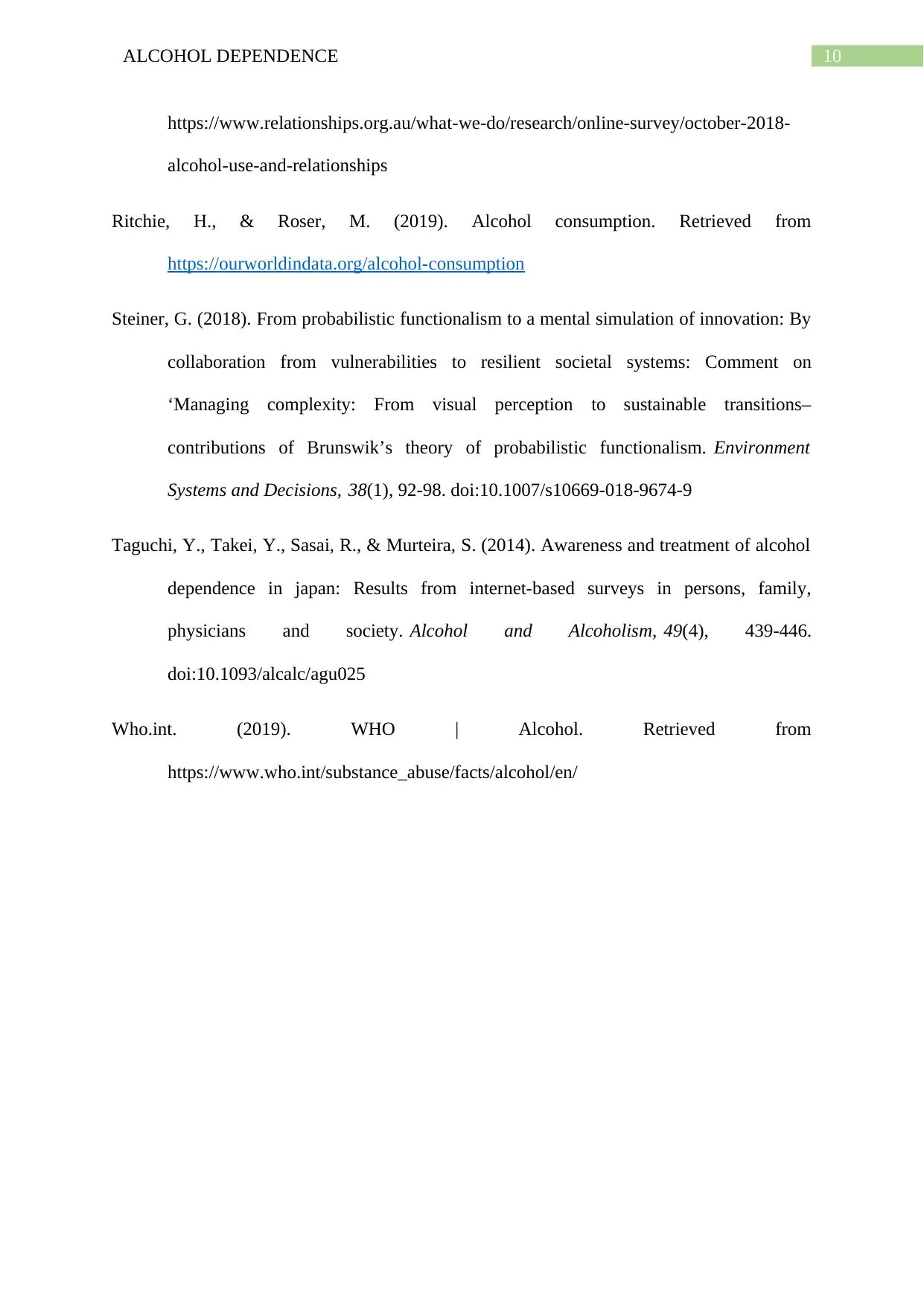
10ALCOHOL DEPENDENCE
https://www.relationships.org.au/what-we-do/research/online-survey/october-2018-
alcohol-use-and-relationships
Ritchie, H., & Roser, M. (2019). Alcohol consumption. Retrieved from
https://ourworldindata.org/alcohol-consumption
Steiner, G. (2018). From probabilistic functionalism to a mental simulation of innovation: By
collaboration from vulnerabilities to resilient societal systems: Comment on
‘Managing complexity: From visual perception to sustainable transitions–
contributions of Brunswik’s theory of probabilistic functionalism. Environment
Systems and Decisions, 38(1), 92-98. doi:10.1007/s10669-018-9674-9
Taguchi, Y., Takei, Y., Sasai, R., & Murteira, S. (2014). Awareness and treatment of alcohol
dependence in japan: Results from internet-based surveys in persons, family,
physicians and society. Alcohol and Alcoholism, 49(4), 439-446.
doi:10.1093/alcalc/agu025
Who.int. (2019). WHO | Alcohol. Retrieved from
https://www.who.int/substance_abuse/facts/alcohol/en/
https://www.relationships.org.au/what-we-do/research/online-survey/october-2018-
alcohol-use-and-relationships
Ritchie, H., & Roser, M. (2019). Alcohol consumption. Retrieved from
https://ourworldindata.org/alcohol-consumption
Steiner, G. (2018). From probabilistic functionalism to a mental simulation of innovation: By
collaboration from vulnerabilities to resilient societal systems: Comment on
‘Managing complexity: From visual perception to sustainable transitions–
contributions of Brunswik’s theory of probabilistic functionalism. Environment
Systems and Decisions, 38(1), 92-98. doi:10.1007/s10669-018-9674-9
Taguchi, Y., Takei, Y., Sasai, R., & Murteira, S. (2014). Awareness and treatment of alcohol
dependence in japan: Results from internet-based surveys in persons, family,
physicians and society. Alcohol and Alcoholism, 49(4), 439-446.
doi:10.1093/alcalc/agu025
Who.int. (2019). WHO | Alcohol. Retrieved from
https://www.who.int/substance_abuse/facts/alcohol/en/
1 out of 11
Related Documents
Your All-in-One AI-Powered Toolkit for Academic Success.
+13062052269
info@desklib.com
Available 24*7 on WhatsApp / Email
![[object Object]](/_next/static/media/star-bottom.7253800d.svg)
Unlock your academic potential
Copyright © 2020–2026 A2Z Services. All Rights Reserved. Developed and managed by ZUCOL.





